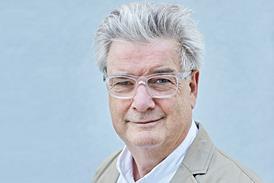The directorãs latest film stars Jude Law as a designer whose life twists out of control after he opens an office in Kingãs Cross. Sonia Soltani finds out what happens when Hollywood tackles love, crime and regeneration
Anthony Minghellaãs films may be dramas in which characters often struggle with intense emotions in the midst of flamboyant decor, but he draws the line at the room in the Dorchester, where this interview takes place. His first reaction to the overwhelming accumulation of chintz, silk, mahogany and red Chinese cabinets is: ãOh, itãs a bit much for the morning.ã
Minghella is here to discuss his latest completed film, Breaking and Entering, which stars Jude Law as a landscape architect whose office in Kingãs Cross is repeatedly broken into (see the review overleaf). It might not win as many plaudits as The Talented Mr Ripley, Cold Mountain or The English Patient (the last won nine Oscars). On the other hand, it does have a guaranteed audience among the construction community. According to Roger Madelin, the chief executive of developer Argent, ãthe whole industry is looking forward to itã.
Madelin himself has a special interest, as Argent is leading the regeneration of Kingãs Cross, where most of the action is set, and it worked with landowner Excel to help set up Minghellaãs shoot. ãOf course weãre going to chuckle ã not nastily ã at the naivety of some of it,ã says Madelin. ãBut itãs fantastic that he chose Kingãs Cross and tried to understand all the details behind regeneration.ã
Minghella has a personal interest in the story, too. Andrew Ogorzalek, the director of PCKO, designed him a studio in Gospel Oak, a dodgy area of north London. After 13 burglaries, all the entrances were boarded up apart from a slit in the door.
Madelin is aware that the intricacies of the construction process donãt necessarily make for mesmerising movies and adds that Minghella was justified in taking some ãcinematographic licenceã. But the director, who will turn 53 in January, says he asked his architect friends for help in an effort to make the professionãs concerns and ideas plausible. ãThe material was passed around a group of architects to ensure that, at the very least, my feeble attempt to personify them wouldnãt be too inaccurate,ã he says.
In his thoughtful, soft-spoken voice, Minghella draws a parallel between making films and creating buildings. Both activities, he says, originate as dreams.
ãFilm-making begins entirely in the realms of the imagination ãÎ and then it becomes very prosaic because it has to fit into a budget and a schedule and the availability of actors and the permissions of locations and the cost of design.ã He thinks the ãtyranny of codes, rules and regulationsã affects architectsã vision in a similar way.
Minghellaãs plan for the film was to show the ãconvulsion of activityã that is going on around Kingãs Cross, and the contrast created by gentrification amid the remnants of rundown estates. Born in the Isle of Wight and now a proud Londoner, Minghella has lovingly photographed the city, shot with the same care as Jude Law and Juliette Binoche.
One of the challenges of shooting in Kingãs Cross was that the area was changing so quickly that he couldnãt find the exact locations he had in mind. ãWhen I was writing, I had a memory of the recent Kingãs Cross that had already been completely eradicated,ã he says. ãItãs a very evanescent understanding that we have of landscape because in cities itãs constantly in flux.ã

So there is no point looking for the office of Green Effect (Lawãs practice) around Kingãs Cross: the production team couldnãt find enough mean streets to set it in. There are still plenty in the East End, though, and an abandoned iron foundry in Bow was rebuilt to become Lawãs state-of-the-art office.
Film-making, like architecture, begins entirely in the realms of the imagination ãÎ and then it becomes very prosaic
The film explores regeneration through characters who fall into two camps: those who think offices and galleries can truly salvage an area and those who see their role as purely cosmetic. As Ray Winstoneãs character puts it, itãs not surprising that tensions occur when high culture and finance set up home in a crack village.
A well-known New Labour supporter, Minghella breaks into a laugh when asked which side of that debate heãs on. ãThe luxury of being a film-maker and a writer is that I agree with everything that everybody says. Obviously, because I wrote it,ã he quips.
Regaining his composure, he muses about the poor transport system between east and west London, the former state of decay at Kingãs Cross and the notion of progress.
ãIn the process [of regeneration] a particular character and a particular population will necessarily be ãÎ altered. There is a cost to that. Itãs not only nostalgia, although itãs partly nostalgia.ã
But itãs towards the future that Minghella is now looking. As a member of the Culture and Creativity Advisory Forum for the 2012 Olympics, and chairman of the British Film Institute since 2002, he says heãd love to see a film centre built in London. Of course, this would have to be an iconic building.
ãItãs perhaps the most obvious reference but Iãd like to see a building of the characteristics and qualities of Frank Gehryãs Guggenheim or the Disney Concert Hall, some visionary building that changes the way people look at a landscape.ã
Incidentally, Sketches of Frank Gehry, a documentary on the architect directed by Sydney Pollack and produced by his and Minghellaãs production company Mirage, will be released in the UK next spring.
Minghellaãs next project is slated to be an adaptation of Liz Jensenãs novel The Ninth Life of Louis Drax. But he doesnãt know whether heãll direct more films that tackle architecture.
At the moment, he relishes what he describes as ãan enormously privileged existence to be able to do mistakes on filmsã ã as opposed to not being able to make films at all. Before directing movies, Minghella worked as a script editor for Eastenders and Grange Hill and a writer for Inspector Morse in the 1980s. ãThe most frustrated people in the world are architects that canãt get their buildings made or directors that canãt get their films made,ã he says.
Some food for thought as the directorãs healthy breakfast of red berries, banana and plain yoghurt is delivered. It seems he doesnãt like the Dorchesterãs fancy pastries either.
Postscript
Breaking and Entering is on general release from 10 November


























No comments yet